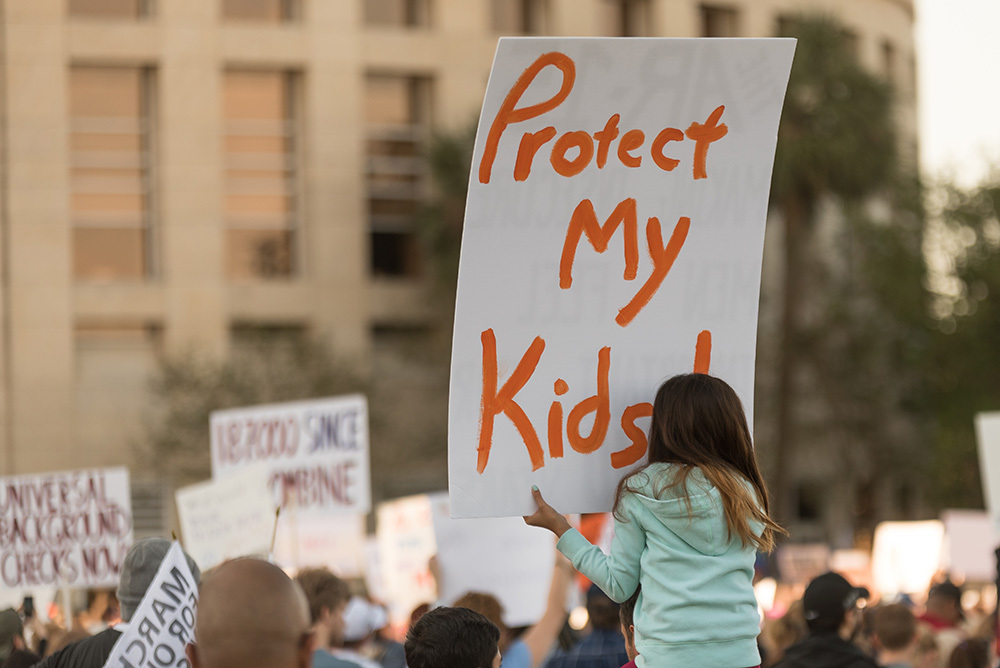The next battleground in U.S. politics? School boards

Takeaways:
- Typically nonpartisan school boards have become increasingly polarized.
- Board members faced sharply divided communities during the COVID-19 pandemic.
- Political parties and special interest groups are fueling the polarization over education.
School board members facing death threats. Protesters disrupting meetings over vaccines and sex education. Activists demanding schools ban books and critical race theory.
Welcome to the new front in America’s culture wars: local school boards.
Often obscure and largely nonpartisan, school boards have become increasingly politicized in recent years. National policy debates have seeped into local school boards, said Julie Marsh, professor of education policy at the USC Sol Price School of Public Policy. Political dynamics typically seen in larger, urban districts – such as teachers’ unions fights with charter schools – are now playing out in more areas.
Meanwhile, political organizations, particularly conservative groups, are using school boards to advance their ideologies and build a bench of candidates for future elections, she added.
“We’re seeing a widening of disagreement on matters of education policy that often falls along party lines, and party members embracing, in some ways, more extreme positions,” Marsh said. “And so we’re seeing an erosion of the nonpartisan nature of local school boards.”
School boards grapple with divided communities

Marsh, who is also a professor at the Rossier School of Education, was part of a team of researchers who examined how seven California school districts handled the early months of the COVID-19 pandemic and racial reckoning after George Floyd’s murder. Although the seeds of politicization were sowed before those historic events, many school boards faced harsh backlash to online instruction, anti-racism efforts and other policies to address those issues.
“A lot of them were experiencing very divided communities,” Marsh said of the school board members she interviewed. “They were getting heated messages from constituents on both sides of the debate, for example, around reopening. It was complicated because they were receiving constantly changing and sometimes conflicting information from various authorities.”
Marsh’s research took place just as these political debates heated up. Since then, voters have recalled school board members. Other board members were verbally abused and physically assaulted, according to a letter from the California School Boards Association. The National School Boards Association wrote to President Joe Biden asking for help with the increased harassment and intimidation.
The board members that Marsh followed may have held different political views, but they tried to stay in unison with their decisions and those of their superintendents to avoid creating more conflict, she said. The situation ultimately exhausted them.
“You could imagine the strain that was put on district leaders during that time,” Marsh said.
Political parties fuel polarization of education

This tense political environment has pushed public servants away from school boards, said Frank V. Zerunyan, USC Price School professor of the practice of governance, who trains school board members and other local government officials. “Unfortunately, I’ve seen resignations. I’ve seen people not run for a second term,” he said.
Zerunyan, a four-term mayor in Rolling Hills Estates in Los Angeles County, has been in policymaking positions for 25 years. The past five of them have been the most polarized, he said. Over that same period, Zerunyan said political parties have become more involved in local elections.
“Especially at the school boards nowadays, all of a sudden people are running for office with agendas of red or blue,” he said. “That wasn’t the case at all before. People ran to benefit children. That was it.”
Governors or political parties should not interfere with the decisions of local school board members, who are elected to make policy for the district, Zerunyan said.
“All governors, red or blue, should butt out and let local school districts make the appropriate policy for their school districts,” he said. “Governors or political parties are not helping but making it worse. The only people accountable for the curricula is the school district. If constituents do not like them then they can remove them or not elect them. This is how democracy works.”
Polling shows parents still support school boards
Despite the increased partisanship, most California voters still support school boards, according to a poll conducted last year by Marsh and her colleagues. More than two thirds agreed that local school boards are important, according to the survey from the Policy Analysis for California Education and Rossier School.
However, the poll also found much of the support falling along partisan lines, with 55% of Democrats versus 33% of Republicans reporting that school boards have a positive impact on the quality of education in California’s K–12 schools.
It’s too early to know how much this politicization is affecting policy outcomes of school boards, Marsh said. Anecdotally, there’s evidence that some school boards are reversing decisions they made in response to Floyd’s murder, such as cutting funds to school police. More research is needed to understand how school board members are navigating the political moment, she said.
“There’s also room for some optimism,” Marsh added, pointing to efforts to increase student and diverse representation on school boards.
“We’re seeing people coming out and pushing school systems to address issues of injustice, and people being aware of the power the board has,” Marsh said. “Those are all opportunities that we could lean into and learn more about.”